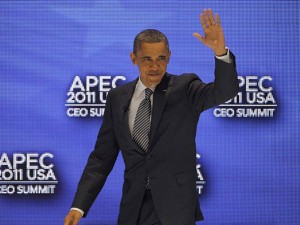HONOLULU – President Barack Obama signed a bill Saturday making it easier for U.S. business travellers to access Asia-Pacific nations more freely and quickly.

U.S. President Barack Obama waves to the audience before participating in a discussion at the APEC CEO Summit, a gathering of business leaders at the Asia-Pacific Economic Cooperation summit in Honolulu on Saturday, Nov. 12, 2011. ANDRES LEIGHTON/AP PHOTO
Obama signed the measure just before taking the stage to address the Asia-Pacific Economic Cooperation CEO Summit in his native Hawaii, referring it to it as an “APEC business gold card.”
The APEC Business Travel Card (ABTC) allows pre-screened business travellers easier entry to most of the 21 APEC member economies. The card removes the hassle of individually applying for visas or entry permits for every visit. It also allows multiple short-term entries into participating economies during the three years the card is valid. Card holders also benefit from faster immigration processing via special APEC fast lanes at major airports.
“Everybody here appreciates it because they’re not going to have to wait in line as long at the airport,” Obama told the CEOs. “So that generated a lot of popularity.”
Obama said his administration is going to keep pursuing “every avenue that we have to see how we can ease and smooth the ability of doing business with the United States and U.S. businesses being able to operate overseas.”
“And some of that has to do with us changing our own internal operations,” he said.
Besides easier access, the program was created in 1997 to help promote new business opportunities, attend meetings and conduct trade and investment activities.
Monica Whaley, president of the National Center for APEC, said for all the successes that come out of APEC this year, the card will be one that Americans will be able to hold in their hands.
The card, she said, “will help American business travellers spend less time waiting in lines at the airport, and more time closing deals in the APEC region.”
The participating APEC member economies are: Australia, Brunei, Chile, China, Hong Kong, Indonesia, Japan, Korea, Malaysia, Mexico, New Zealand, Papua New Guinea, Peru, Philippines, Singapore, Taiwan, Thailand and Vietnam.
Russia and Canada are transitional members while Mexico is part operational moving towards full participation in the program that was created in 1997.
Australia, which was one of the first three to join the program along with South Korea and the Philippines, has among the highest share of cardholders.
The legislation was unanimously approved by the Senate earlier this month after being introduced this summer by Sens. Daniel Inouye, Daniel Akaka and Maria Cantwell.
Akaka earlier said, the program would help Hawaii and the rest of the United States to expand into growing Asian markets while creating jobs at home.
Besides the National Center for APEC, the legislation was supported by National Foreign Trade Council, US-ASEAN Business Council, U.S. Chamber of Commerce, U.S.-China Business Council and U.S. Council for International Business.